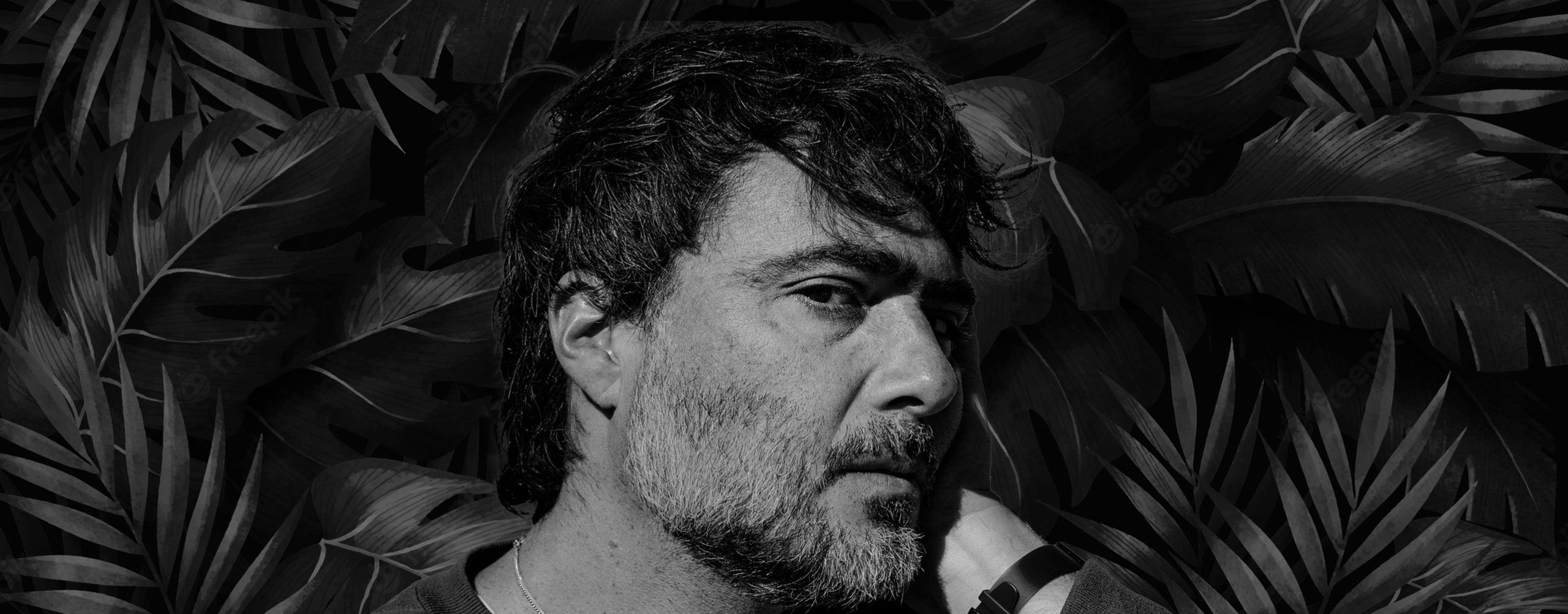We talked to Simón Mejía, one of the leaders of the band Bomba Estéreo, to know more about his current artistic, collective and personal projects.
Could you tell us a little bit about your history? Before music, were you dedicated to anything else?
I always liked music, since I was a child. I used to listen to my parents’ vinyl records, a lot of 70’s music. When my mother realized that I had an ear for it, she put me in piano lessons and that’s how I learned to play. After that, as a teenager, I switched to guitar, took lessons and played in metal and rock bands. Then I left the classes and continued to learn everything by ear, empirical training. When I left school and went to college, I chose not to study music, but visual arts and I did a career focused on film and video. After college, I worked in television and then formed a documentary production company. Parallel to this I always had music as a hobby. When electronic music arrived in Colombia, at the end of the 90’s, I began to listen to this sounds and I went from playing in bands to samplers and sequencers, to the computer. I started making house music. The whole time I kept playing, recording and sequencing real instruments, especially guitar and bass. In that moment I realized that making house in Colombia was something absurd, when we had our own house which is Cumbia and tropical music. Our danceable music.
How did Bomba Estéreo begin?
I started mixing both genres and a project prior to Bomba Estéreo was born, called AM770. We mixed tropical music samples with more electro beats and sounds. It was a sort of video sound system: a DJ with vinyl, a percussionist, a VJ and me playing guitar and synth. The singers were various and itinerant, they came and went. That was the genesis of Bomba Estéreo.
Could you tell us about your musical references and influences?
When I was a kid, I was influenced by a lot of music from the 70’s: Motown, Rock, Fania’s Salsa, etc. As a teenager I liked rock in general, hard rock, heavy rock, all that stuff like Guns n’ Roses, Poison, Metallica… Rock from the 60’s and 70’s as well, the classics like Led Zeppelin, Black Sabbath, etc. Then, at the beginning of the 90’s, alternative rock, The Cure, Pixies, Nirvana. With the electronic music wave of the late 90’s I really liked the sound of Bristol, Massive Attack, Tricky, Portishead, Daft Punk and Chemical Brothers. I liked electronic music, but more from bands than DJ’s. In parallel to that I started to explore tropical music, Fania’s salsa, all the folklore of Colombia where Cumbia is the queen. Today, because of this, my tastes are quite eclectic, I can enjoy all of the above. Although at home, what I listen to the most are movie soundtracks, scores, or ambient music.
How does your history with rock relate to your current work?
Rock for me, more than a genre, is an attitude in life, a stance that doesn’t conform to the status quo. I think it has to do with strength and charisma. I’ve seen DJ’s that are more rock than a rock band for example. So, the idea goes beyond the music itself. In my case, I feel that Bomba Estéreo, for example, even if we do tropical and dance music, has a strength that comes from rock, from the instrumentation, bass, guitar, drums and vocals, to what happens on stage. Seeing a show of the band is a rock experience.
How does Bomba Estéreo influence your personal work?
It is my eldest child, so to speak, the best known and the one that has allowed me to do everything else I do, because it is already an established brand that people recognize and fortunately respect. Bomba was my first way to explore and experiment with music and search for my own artistic identity using electronic and more rootsy music. They are still two genres that I appreciate very much and that are present in every work I do, in a different way every time.
What do you think about incorporating indigenous influences into current musical genres?
With indigenous music you have to keep something in mind and that is that the music they make is not for entertainment, generally, unlike the music we make in the white world. This music has another purpose, which is more in the realm of the spiritual and the connection with nature and their gods. Music is an instrument to create that bridge between the physical and the non-physical world and, beyond the dance that it can generate, it is made with a healing, spiritual, mystical purpose. We, in the white world do not understand much of this, including myself. So, in doing so, we must be aware of this other way of seeing the world and the music that these communities have, respect it and maybe help to enhance it in our world.
Can you tell us about the short film “El Duende”? How has it been exploring this new format with Bomba Estéreo?
As I mentioned before, Bomba is the key that opens doors and can expose different kinds of things to a wider audience. I find it very interesting to be able to use that name to present audiovisual content, in this case, which also has to do with the band’s artistic DNA. “El Duende” is about Colombia’s root music, such as the marimba music of the Pacific and the myths that surround it. That’s what the short film is about. It is a psychedelic journey through images and sounds of this part of the world. It is also an encounter between that music and electronic music, because it all started from a series of remixes I made of the music of the Torres brothers, the protagonists of this film. That’s what the soundtrack is. With all this, I seek to expand the idea that Bomba is just a band, but rather a generator of content and artistic experiences in different formats.
Colombia has experienced important social movements in recent times, how does this relate to music? How does music contribute in this context? How do you see the general process that Latin America is going through at the moment?
I think that we are perceiving the beginning of a change that will take many years, because there are many conflicts in Latin America and very deep rooted. Each country has its own processes and problems to be solved, but it is precisely from the change in the political viewpoint that we can begin to build this new Latin America. As always, most of the problems are due to the politicians and the way in which power has been managed throughout history. On the other hand, I think we have to reach a point where all Latin America is united as one. Not to continue acting as small individual countries with no voice or vote in the international arena, but as the cultural, territorial, mega-diverse unity that we are. Without this, I see it difficult to achieve important things as a region of the world.
Personally, the struggle that I have appropriated for myself is to communicate through my artistic work the power of nature, ecosystems, minority communities and the exceptional music that comes out of these places. Without the jungles, the rivers, the seas, the wilderness of Colombia, for example, and the communities that for centuries have been making music there, inspired by that same nature, there would be no Bomba Estéreo, nor the great music that comes out of this country, such as Cumbia for example.
Where would you like to be in a few more years?
Physically here in Colombia, a country I have never left and I don’t think I will leave, with my family and everyone in good health. But you never know where life will take you. And artistically, exploring new territories, new formats, that hopefully mix images with sound, and with music of course, and that make people think and feel things different from what is presented on television and social networks. In the territory of art, always.
If you want to see El Duende it is open to the public here.
To directly support the musicians from the Pacific of Colombia, who live in difficult conditions, you can buy their music on Bandcamp.

